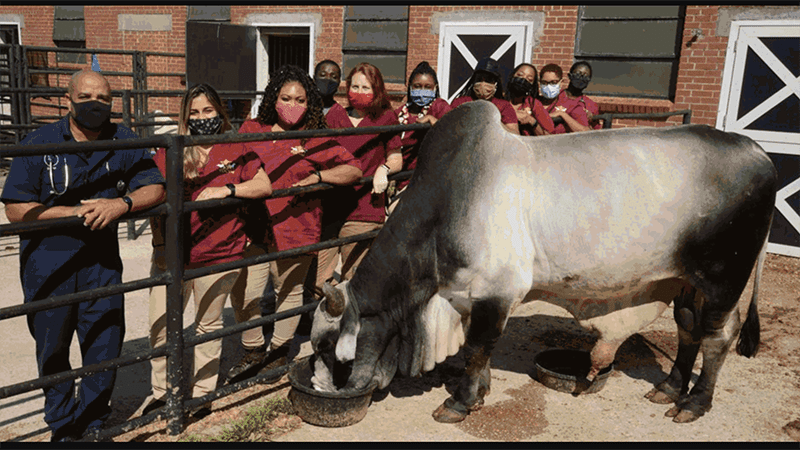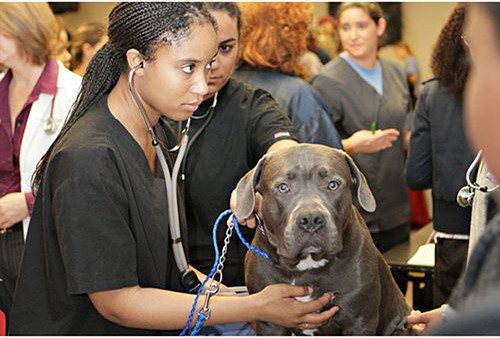Diversity in Animal Health: Make Your Mark in Veterinary Science

Veterinary science deals with the study and practice of caring for animals’ health and well-being. While many veterinary scientists make a career of caring for household pets like dogs and cats, specialists in the field care for livestock, exotic pets, and wildlife. Others pursue careers in veterinary research, studying and innovating the ways practitioners care for their patients. As a field with numerous avenues, veterinary science is an ideal major for anyone with an affinity for animals, science, and people.
Why We Need More Veterinarians of Color
The need for diversity in the field of veterinary medicine has never been more apparent. Currently, the field is considered among the “whitest” professions in the US, and as of 2022, just 2.2% of veterinarians were Black. As with any field, representation and community matter, both for existing veterinary science workers and for aspiring students. Seeing successful professionals who look like them can inspire more students of color to pursue careers in veterinary medicine.
Yet increasing the number of Black veterinary science majors is not merely a matter of equal representation; it is crucial for enriching the field with diverse perspectives and experiences that can lead to more effective and culturally competent care.
Culturally Relevant Services
Black veterinarians can provide culturally relevant services and better understand the specific needs of diverse communities — including the roughly 37% of Black American households with pets — leading to improved animal care and public health outcomes. This combination of representation and competence is essential for breaking down systemic barriers to accessible, nuanced pet care.
Lucrative, Meaningful Careers for More Graduates of Color
In a world where STEM careers are increasingly associated with higher earning potential and job security, encouraging more Black students to major in veterinary science also opens the door to significant socioeconomic upward mobility and financial security. Veterinarians enjoy a median annual wage that is substantially higher than the median for all occupations, and careers in this field can offer more prosperity and economic power for more workers of color.

Career Options
Here are just a few of the careers you can qualify for with one or more degrees in veterinary science:
- Traditional clinic veterinarian (small or large animal medicine)
- Veterinary specialist (internal medicine, cardiology, etc.)
- Veterinary research scientist
- Animal shelter veterinarian
- Animal health product professional (in research, sales, technical services, and more)
- Public health veterinarian (for things like vaccine development and the control of zoonotic diseases)
- Veterinary public policy professional (advocacy at federal and state levels)
- Regulatory medicine professional (protecting the health and safety of animals and people who consume animal products)
- Veterinary practice manager
- Veterinarian in the US Armed Forces
- Educator
Whatever your interest, students who plan to pursue veterinary careers will need to enroll in a related degree program. Bachelor’s degrees in biology, veterinary science, or veterinary technology are excellent choices. However, there are multiple academic paths that can prepare you for veterinary school (which is a specialized graduate school) or a two-year veterinary technology program. As long as you fulfill the necessary prerequisites for attending and completing veterinary school, you can qualify for high-level positions in this field.
Majors that prepare students for veterinary schools and careers include a wide range of related course subjects — science naturally being the most valuable — and may offer different concentrations. Courses may include:
- Chemistry
- Organic chemistry
- Biochemistry
- Microbiology
- Molecular and cell biology
- Biology
- Zoology
- Physics
- Mathematics
HBCUs Can Help You Start a Career in Veterinary Science
Given the recent Supreme Court ruling on affirmative action in college admissions, more Black students are likely to turn to historically Black colleges and universities (HBCUs) for their education. In response, these institutions will do everything they can to meet increased student demand. HBCUs help more students earn college degrees, compete successfully for well-paying jobs in competitive career fields, improve workforce diversity, and increase upward economic mobility.
People of all ages, races, and life paths can help to improve diversity in American veterinary science disciplines by supporting scholarships and other forms of funding for HBCUs with related programs. You can make a difference in the lives of veterinary science students in one easy step by making a donation today.
Want to learn more about this possible career path and college major? Have questions about which UNCF colleges and universities offer degrees in veterinary science? Looking for help with financing this degree?
Click Here So We Can Help You!
How to Prepare for Success
All veterinary and science majors need to have some basic, foundational understanding of chemistry, biology, and ethics. A background working with animals in a domestic or agricultural setting will be beneficial. However, students who plan to work in a traditional veterinary practice will also need excellent communication, interpersonal, and multitasking skills, as well as strong capabilities in mathematics and various science disciplines.
UNCF Schools to Consider
Only one UNCF-member HBCU offers a pre-veterinary bachelor’s degree program specifically: Tuskegee University. However, it’s common for students to earn a bachelor’s degree in a broader science before continuing to veterinary school. Naturally, biology is a popular choice. These high-ranking UNCF-member schools offer programs in biology:
- Morehouse College
- Spelman College
- Clark Atlanta University
- Xavier University of Louisiana
- Johnson C. Smith University
- Claflin University
- Virginia Union University
- Tougaloo College
- Florida Memorial University
Professional Organizations
There are many organizations in various fields of veterinary science that offer more insight into working in those professions. A sample list includes:
- American Society of Animal Science (ASAS)
- American Association for Laboratory Animal Science (AALAS)
- American Animal Hospital Association (AAHA)
- American Veterinary Medical Association (AVMA)
- American Association of Veterinary Medical Colleges (AAVMC)
- Iowa Veterinary Medical Association (IVMA)
- United States Animal Health Association (USAHA)
Scholarships Available
There’s no better way to start on your path toward a successful career in veterinary science than with a solid financial foundation. Fortunately, many scholarships are available through UNCF, including some specifically for veterinary science majors. Keep an eye on the UNCF website for current scholarship opportunities and announcements.
Search for specific scholarships and view those that are currently accepting applications here! Students should also check with each college or university to see if there are additional scholarships available to study veterinary science.
As you explore your options, be sure to use our guide to applying for scholarships and grants. You can also receive guidance by submitting a major interest form if you are interested in a career in veterinary science. Submit the form on our website to get started. And follow us on UNCF social media channels to receive notifications about our scholarships and member HBCUs. Reach out today!
You can also show your support for students pursuing careers and furthering equity in veterinary science by contributing to UNCF member schools. Education is the greatest tool we have in creating a just and equitable society where truth reigns and economic mobility is available to all. Help us achieve this future by donating today!
